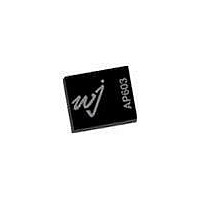AP603-PCB900 TriQuint, AP603-PCB900 Datasheet - Page 6

AP603-PCB900
Manufacturer Part Number
AP603-PCB900
Description
RF Modules & Development Tools 869-960MHz Eval Brd 17dB Gain
Manufacturer
TriQuint
Datasheet
1.AP603-PCB2140.pdf
(14 pages)
Specifications of AP603-PCB900
Board Size
6 mm x 5 mm x 1 mm
Minimum Frequency
869 MHz
Minimum Operating Temperature
- 40 C
Supply Voltage (min)
28 V
Product
RF Development Tools
Maximum Frequency
960 MHz
Output Power
7 W
Supply Voltage (max)
80 V
Supply Current
246 mA
Maximum Operating Temperature
+ 85 C
For Use With/related Products
AP603
Lead Free Status / RoHS Status
Lead free / RoHS Compliant
Other names
1067337
WJ Communications, Inc • Phone 1-800-WJ1-4401 • FAX: 408-577-6621 • e-mail: sales@wj.com • Web site: www.wj.com, www.TriQuint.com
Typical WCDMA Performance at 25 °C
Frequency
W-CDMA Channel Power
Power Gain
Input Return Loss
Output Return Loss
ACLR
IMD3 @ +30 dBm PEP
Operating Current, Icc
Collector Efficiency
Output P1dB
Quiescent Current, Icq
Vpd, Vbias
Vcc
14
13
12
11
10
-40
-45
-50
-55
-60
-65
9
at a channel power of +30 dBm
30
22
1930 MHz
1960 MHz
1990 MHz
Unconditionally stable version of this application circuit is available for download off of the website at: http://www.wj.com
1930 MHz
1960 MHz
1990 MHz
AP603
High Dynamic Range 7W 28V HBT Amplifier
ACLR1 vs. Output Power vs. Frequency
Gain vs. Output Power vs. Frequency
32
24
L3
Average Output Power (dBm)
CW tone, Vcc = 28V, Icq = 160 mA, 25 ˚C
WCDMA, Vcc = 28V, Icq = 160 mA, 25 ˚C
C5
Output Power (dBm)
W-CDMA 3GPP Test Model 1+64 DPCH, 60% clipping, PAR = 8.6 dB @ 0.01% Probability, 3.84 MHz BW
1930-1990 MHz Application Circuit Performance Plots
1930-1990 MHz Application Circuit (AP603-PCB1960)
34
26
36
28
C28
+38.5 dBm
1960 MHz
+30 dBm
230 mA
160 mA
-49 dBc
-52 dBc
15.5 %
38
30
7.5 dB
13 dB
+28 V
13 dB
+5 V
40
32
275
250
225
200
175
150
-10
-15
-20
-25
-5
0
1.8
Notes:
1. The primary RF microstrip line is 50 Ω.
2. Components shown on the silkscreen but not on the schematic are not used.
3. The center of L3 is placed at 0.115” (9.8° @ 1960 MHz) from the center of C5.
4. The center of C5 is placed at 0.100” (8.5° @ 1960 MHz) from the edge of the AP603 (U1).
5. The center of C28 is placed at 0.300” (25.6° @ 1960 MHz) from the edge of the AP603 (U1).
6. The center of C29 is placed at 0.420” (35.9° @ 1960 MHz) from the center of C28.
7. The bold-faced RF trace is for the DC bias feed. The stub’s length is approximately a ¼ λ.
22
1930 MHz
1960 MHz
1990 MHz
1.85
Icc vs. Output Power vs. Frequency
24
WCDMA, Vcc = 28V, Icq = 160 mA, 25 ˚C
Average Output Power (dBm)
S11, S22 vs. Frequency
Vcc = 28V, Icq = 160 mA, 25 ˚C
100pF
1.9
Frequency (GHz)
26
1.95
28
2
See note 3
4.7nH
L3
30
2.05
S11
S22
2.1
See note 4
C5
3.3pF
32
Specifications and information are subject to change without notice
1000pF
C7
50
40
30
20
10
25
20
15
10
0
5
0
22
22
1930 MHz
1960 MHz
1990 MHz
Efficiency vs. Output Power vs. Frequency
Efficiency vs. Output Power vs. Frequency
1930 MHz
1960 MHz
1990 MHz
24
Average Output Power (dBm)
CW tone, Vcc = 28V, Icq = 160 mA, 25 ˚C
WCDMA, Vcc = 28V, Icq = 160 mA, 25 ˚C
26
Output Power (dBm)
26
W = .030”
L = 1.035”
30
C28
3.3pF
See note 5
Page 6 of 14 May 2007 ver 1
28
C29
1.2pF
See note 6
34
30
100pF
32
38














